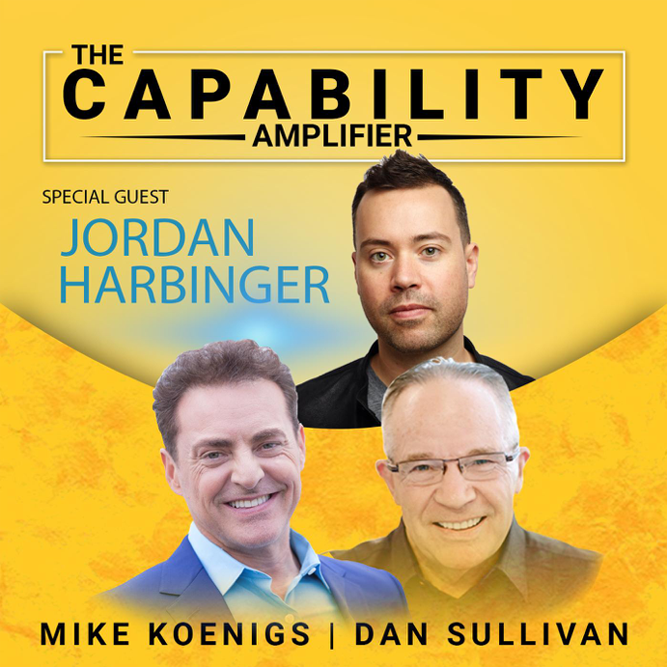A Conversation With “The Larry King Of Podcasting,” Jordan Harbinger
Episode 36

This week’s episode features the strongly opinionated and often controversial Jordan Harbinger, a top podcaster with millions of downloads who is referred to as “The Larry King of Podcasting.” He knows what he’s talking about when it comes to podcasting AND he’s done his research on YouTube so he has some real, honest insight into both platforms.
If you have a successful business and are thinking about throwing your hat into either the podcasting or YouTube ring, but aren’t sure which platform is better for growth, time management, and monetization, then you’re going to want to keep reading (and listening).
I begin the interview by asking Jordan what worries him the most about his business in the current climate of super-short attention spans and “Kardashianized” marketing. Here’s what he had to say:
“What worries me comes from an old saying, don't build your business in someone else's walled garden. In other words, platforms you don’t own or have any control over like Facebook or Apple iTunes. I have a podcast so, at the end of the day, I am still beholden to the platform. It stinks and doesn't stop me from doing anything… BUT there could be a millennial that works at one of these companies, woke up on the wrong side of the bed one day and there goes your income stream. You just have to piss off the person who runs the content review team at some company, and you're done.”
In today’s “cancel culture,” YouTube, Instagram, Facebook, and Twitter could decide for some arbitrary reason that a piece of content you created five years ago offends a short, plump, three-legged, green alien who decided to unionize your business, and THEY could remove your channel and all of your followers because someone’s feelings were hurt when you expressed your right of free speech. Where would you be then?
We live in a world now where open rates and click-through rates with email are miserable at best. I think the most engaging platform is podcasting, but it really comes down to how you train your audience to react and respond to you. My message has always been the same: Get people to leave a platform page, get their email address, and build a REAL relationship with them because it's easier to monetize. There is no Holy Grail, and I think right now, the world of “platforms” is more scattered than ever before.
Virtually every “influencer” on YouTube is screwed right now because they’re being demonetized and penalized, losing their incomes and sometimes their channels AND they never took the time to think ahead and build a list they controlled.
Jordan has been asked many times why he hasn’t started and focused on building a YouTube channel. He definitely thought about it but ended up sticking with podcasting, and here’s why. He asked a lot of his YouTuber friends who are highly successful with a million-plus subscribers and found some pretty disturbing figures from people he thought would be printing money. They aren’t. They aren’t dirt poor, but they’re certainly not wealthy from it either.
But here’s the REAL rub … these guys are doing 12-hour days because YOU CAN’T OUTSOURCE YOUR PERSONALITY. You can outsource the comments, the email, the customer support, the editing, but you can't outsource YOU being the guy that does all the funny stuff in the videos. They have teams of 16 to 20 people, they’re filming eight hours, and editing. They look like they haven’t had a vacation in two decades … because THEY HAVEN’T!
It's just not all it's cracked up to be. There's no asset to sell. “Influencing” isn’t a real business.
There’s also the whole “optimizing for YouTube” quagmire that people fall into. Maybe you start off doing a podcast talking about topics you really enjoy—things that are conversational, intellectual, and thought-provoking—but your download growth rate is SUPER slow so you try YouTube because it’s easier to get a lot more views.
Then you find out that the long format, podcast-style conversation doesn't do as well on YouTube as when you cut it into clips. And those clips don't do as well as when you cut it into really short little vignettes. And those vignettes are better when they're animated or have graphics. Then, suddenly, instead of having a long format, one-hour conversation with an expert on marketing or stoicism or infectious diseases, you’ve got a minute-and-38-second animation with a bunch of silly stuff that's not even a topical overview of what your show originally was. Your content goes from what you really enjoyed and what people got a lot of value out of to “fluffy bullsh*t” and now you can’t go back—you’ve got 2 million YouTube subscribers, NONE of whom want to see you have an hour-long conversation with the chairman of Google.
Appealing to the lowest common denominator is an unsustainable business. There is no money in it and it is a race to the bottom, period! If you want to hear the rest of our conversation and Jordan’s theory about “The Jerry Springer Effect” (which I highly recommend because it’s SPOT ON), then give the episode a spin!
Enjoy!
Get A Free Capability Amplifier Business Growth Toolkit & Know When a New Episode is Released!
Just enter your name and email address and we'll notify you when our latest episode has arrived! Don't worry...we hate spam too and respect your privacy.


